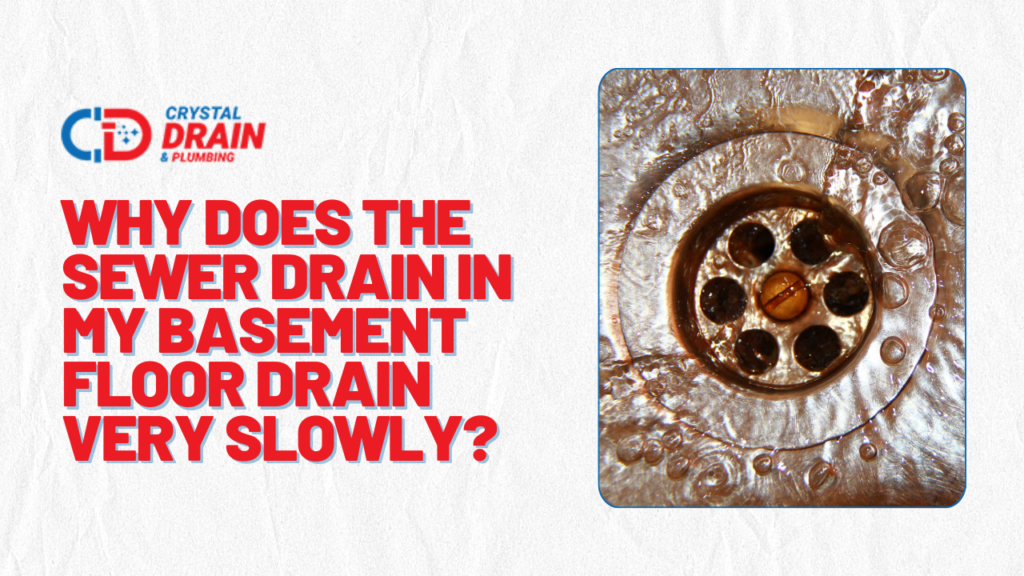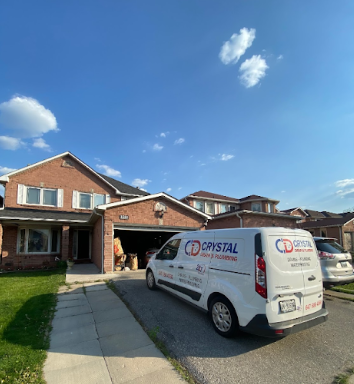Why Does The Sewer Drain In My Basement Floor Drain Very Slowly?

Dealing with a slowly draining sewer line in your basement can be frustrating and inconvenient. Slow drainage can lead to standing water, foul odors, and potential damage if not addressed promptly. At Crystal Drain & Plumbing, we are dedicated to diagnosing and resolving such issues efficiently. Here’s a detailed guide on the common causes of slow-draining basement floor drains and how to address them!
Common Causes of Slow-Draining Basement Floor Drains
1. Clogged Drains
Issue:
Accumulated debris like dirt, hair, soap scum, and other materials can clog your basement floor drain over time, significantly slowing down the drainage.
Solution:
Regularly clean your drains using a plunger or a drain snake to remove minor blockages. For more severe clogs, consider using a chemical drain cleaner or call a professional plumber for a thorough cleaning.

2. Tree Root Infiltration
Issue:
Tree roots can invade your sewer lines through small cracks and joints, causing significant blockages. These roots can grow and expand inside the pipes, obstructing water flow.
Solution:
Tree roots in sewer lines are best handled by professionals. Our team at Crystal Drain & Plumbing can perform a sewer camera inspection to identify root intrusion and remove the roots using hydro-jetting or other specialized methods.
3. Pipe Scaling
Issue:
Over time, mineral deposits and scale can build up inside your pipes, narrowing the diameter and slowing down the drainage. This is especially common in older plumbing systems.
Solution:
Hydro-jetting is an effective method for removing pipe scaling. This process uses high-pressure water to clear out the mineral buildup, restoring the pipe’s original diameter and improving water flow.
4. Collapsed or Damaged Pipes
Issue:
Pipes can collapse or become damaged due to age, ground movement, or heavy loads above the ground. Such damage can block the sewer line entirely or partially, leading to slow drainage.
Solution:
If you suspect a collapsed or damaged pipe, it’s crucial to contact a professional plumber. Crystal Drain & Plumbing offers trenchless pipe repair and replacement services to fix the issue with minimal disruption to your property.
5. Improper Venting
Issue:
Venting issues can also cause slow drainage. If your plumbing vent is blocked or not functioning correctly, it can create negative pressure in the pipes, slowing down the water flow.
Solution:
Ensure that your plumbing vents are clean and unobstructed. If you notice continual venting issues, a professional plumber can inspect and correct the problem.
6. Sewage Backup
Issue:
A sewage backup can occur if the main sewer line is blocked or overloaded, causing wastewater to flow back into your home’s basement drain.
Solution:
Sewage backups require immediate professional attention. Our team at Crystal Drain & Plumbing can use advanced techniques like hydro-jetting and video camera inspections to clear the blockage and prevent future occurrences.
Preventive Measures and Maintenance Tips
Keeping your plumbing system in top condition requires regular attention and proactive steps. Here are some tips:
- Regular Inspections: Schedule annual plumbing inspections to catch and resolve issues early.
- Routine Cleaning: Use enzyme cleaners periodically to keep your drains free from organic buildup.
- Proper Disposal: Avoid flushing grease, fats, wipes, and other clog-inducing items down your drains.
- Tree Root Maintenance: Regularly inspect and manage trees near sewer lines to prevent root intrusion.
- Install Drain Filters: Add filters or screens to your sinks and tubs to catch debris before it enters the plumbing system.
- Use a Plumbing Snake Periodically: Even if drains are flowing smoothly, using a plumbing snake periodically can clear minor blockages and maintain optimal water flow.

Choose Crystal Drain & Plumbing for Top-Quality Service!
When plumbing issues arise, trust the experts at Crystal Drain & Plumbing. Serving Toronto and the GTA for over 15 years, we provide reliable, top-quality services using state-of-the-art equipment and advanced techniques. Whether it’s a clogged drain, slow basement drainage, or a plumbing emergency, our certified technicians are available 24/7 to keep your home safe and functional.
FAQs About Slowly Draining Sewer Lines
Yes, a plunger can sometimes help clear minor clogs causing a slow-draining sewer line. Create a tight seal over the drain and plunge vigorously to dislodge the blockage. If this doesn’t work, the clog may be deeper in the sewer line and require professional assistance.
You should call a professional plumber if DIY methods like plunging and snaking don’t resolve the issue, if you notice recurring problems, if multiple drains in your home are slow, or if you suspect serious issues like tree root infiltration or pipe damage.
